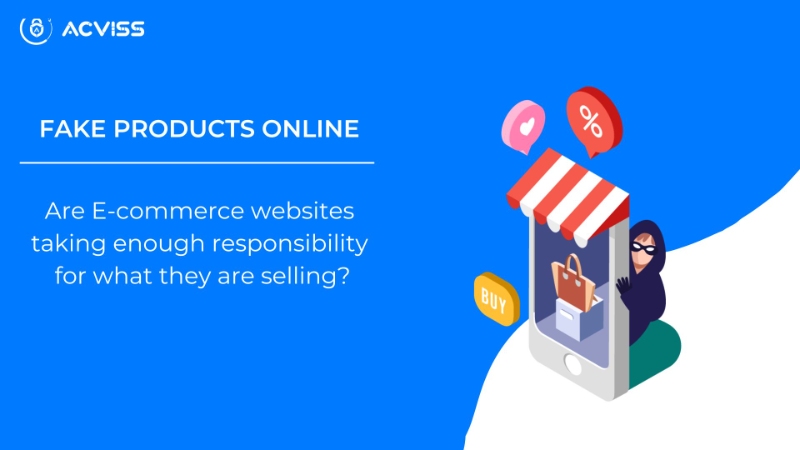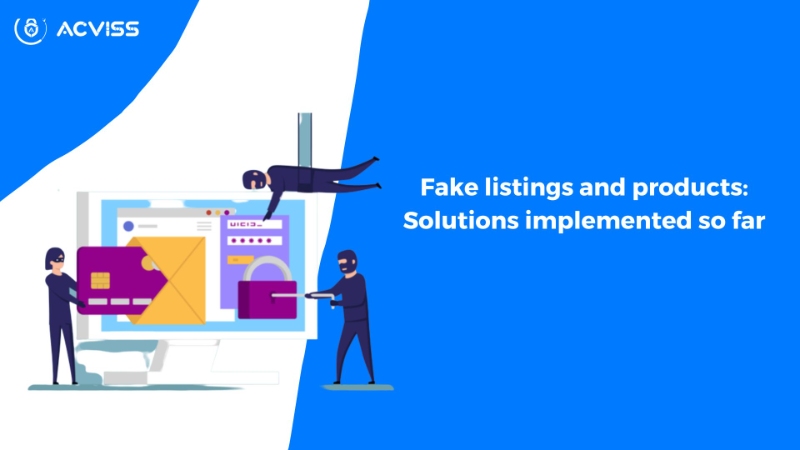Fake Products Online & the Responsibility of E-Commerce Websites

Fake products online: Is it not the responsibility of e-commerce websites to maintain the quality and standard of goods sold on their platform?
How many of us check seller details before buying a product? Only after an increase in fake listings does Amazon start adding the seller's address to the product details. A trusted e-commerce website like Amazon or Flipkart must be authentic if it is fulfilled. Most customers trust reputed e-commerce websites. After all, won't a company worth billions of dollars protect its customers? But even reputed e-commerce websites are filled with fake sellers and counterfeit products. Most e-commerce websites have made attempts to tackle the issue of fakes and fraud. But to what extent are these companies taking real accountability?
Who is at fault, and who takes the fall?
The above question has recently been a topic of debate for the Parliamentary Standing Committee on Commerce. The committee submitted a report titled 'Promotion and Regulation of e-commerce in India' to the Rajya Sabha for further action. The report dismissed all common claims of e-commerce platforms to defer responsibility. For some time, e-commerce giants have been using the volume of transactions and listings as a shield. Claiming they have no control over their listings and sellers can no longer be an excuse. But the report's most intuitive yet valid argument was that while major players shift blame, the customers pay a heavy price.
What happens when the seller associated with an e-commerce platform fails to deliver a product? Who helps a customer facing a loss due to the negligence of sellers?
Indeed, marketplaces do not manage or control the inventory directly. But can reputed E-commerce websites that promote a product on their platform shirk from taking any responsibility for the product? After all, both brands and customers trust the marketplace sites to act as responsible intermediaries.
Draft Rules Set by the Parliament Panel for 2022:
The boom in e-commerce is a welcome sign for India. e-commerce has entered Tier 2 and Tier 3 cities, along with last-mile delivery options. With the global digital transformation, e-commerce is almost unstoppable. The Indian market offers a much-needed environment for e-commerce giants. So the government is set to take a balanced approach without over-regulating e-commerce sites. After all, whom does it benefit if the e-commerce sector takes a beating?
Here are some of the proposed changes:
e-commerce firms need to take the role of intermediaries between the seller and end-user
Large companies need to have a grievance redressal system in place for customer complaints
Flash sales are to be prohibited. But more clarity is expected in this regard.
Third-party sellers cannot sell wholly or partially owned label products of the e-tailers
Overall, the committee recommended that marketplace websites have an active role to play in preventing counterfeit sales. While the regulations are still under discussion, reputed e-commerce websites have taken proactive steps.
Fake Listings and Products: Solutions Implemented So Far:

Have you heard of Amazon's Project Zero launched in 2019 for India? Project Zero was the company's first significant step toward tackling the issue of counterfeit products on its platform. Backed by machine learning technology, Project Zero automatically detects fakes. Brands need to register with Amazon's Project Zero to get its benefits. Are you wondering about the efficacy of this product? Amazon claims that Project Zero is a self-service tool for removing counterfeit products. If your brand detects one fake product listing, then Amazon's system can detect and remove 600 more. The technology is intuitive and self-learning.
Project Zero is not the only initiative taken by Amazon to deal with fake listings and sellers. Amazon has shown some startling numbers by introducing its Brand Protection Report in 2021. To know about Amazon marketplace click here
The company banned 6 million seller accounts and took down 10 billion suspicious products
Amazon now offers seller's addresses as a move to gain customer's trust
As per the report, 1 in 10,000 products sold across the globe through Amazon may be fake
Besides detecting and taking down counterfeits, Amazon has taken many steps toward strengthening IP rights.
Like Amazon, many e-commerce sites have a detailed grievance redressal mechanism. Brands can report fakes by following detailed steps. For example, Alibaba has a dedicated platform for IP protection, once called AliProtect. But who has the time to manually monitor and manually report fakes on Alibaba and AliExpress? The bigger issue is that the onus of reporting and taking down fakes falls on the brand. So, is the eCommerce website in no way responsible for fakes?
Most of the existing anti-counterfeit solutions used by e-commerce websites are not automated.
E-Commerce and Moral Responsibility Towards its Customers and Partners
Online marketplace counterfeit affects multiple stakeholders. Brands are already grappling with the sudden digital transformation. It is no doubt that e-commerce websites are trying to tackle the issue of counterfeits on their platforms. But the solutions need to be more holistic when we look at the number of fakes and their impact.
More than 50% of online buyers have been duped with fake products
Nearly 84%of the customers who bought counterfeit products did not understand that they were being cheated
Luxury brands, sports, and cosmetics are easy targets in the counterfeit market. Substandard products pose a health and safety risk to buyers.
Brands work hard to build a reputation for themselves. They spend money and time engaging with customers to build trust and loyalty. Fake products erode the brand's value
We all need to educate ourselves on the issue of counterfeit products sold online. While vigilance is the key, e-commerce websites can do more. The e-commerce sector has just begun to scale up in India. Now is the time to build customer trust by proactively acting against counterfeiting. Get in touch with us and secure your brand across online and offline channels providing a safe, secure and sustainable shopping experience for your customers.
